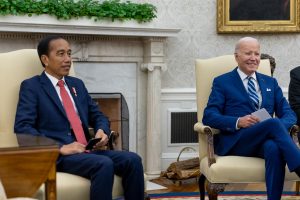Two months after the upgrading of U.S.-Vietnam relations, the White House announced on November 13 that the United States and Indonesia had decided to elevate their relationship to a comprehensive strategic partnership. It was the latest achievement in Washington’s effort to expand its network of partnerships in the Indo-Pacific region and thus deter China’s rising influence in Southeast Asia.
Since the implementation of the Indo-Pacific Strategy, the United States has made serious efforts to improve relations with strategically important countries that have territorial disputes with China. Thus far, the U.S. has not only restored its alliance with the Philippines, which had frayed under the previous Duterte administration, but also brought the country into its anti-China camp under the Marcos administration. In September this year, the U.S. successfully upgraded its relationship with Vietnam to a comprehensive strategic partnership, the most significant victory of Washington’s diplomatic offensive in Southeast Asia after the pandemic.
Indonesia, often viewed as the de facto leader of ASEAN and entangled in a dispute with China over an exclusive economic zone in the South China Sea, has become an additional focal point for U.S. diplomacy in Southeast Asia. Its newfound courtship of Indonesia culminated in President Joko “Jokowi” Widodo’s visit to the White House and the relationship upgrade in mid-November.
The United States has several strategic objectives in deepening ties with Indonesia. First, by fostering a robust relationship with Jakarta, Washington could strengthen its ties with ASEAN to influence its perspective amid intensifying China-U.S. competition. As U.S. President Joe Biden stated, the United States and Indonesia are bound by a shared commitment to ASEAN centrality and the common principles outlined in the ASEAN Outlook on the Indo-Pacific and the U.S. Indo-Pacific Strategy. Since Indonesia played a key role in proposing and advancing the ASEAN Outlook on the Indo-Pacific, the U.S. has sought to enhance the strategic links between the two strategies by elevating its relationship with Indonesia.
Second, the U.S. aims to expand its military presence in the Indo-Pacific region by strengthening security cooperation with Indonesia, thereby countering China’s growing military influence. Already, the United States has expanded the number of military bases in the Philippines to which the U.S. military has access from five to nine. While Vietnam and Indonesia are not U.S. allies, and are unlikely to accede to hosting U.S. bases, Washington is expanding defense ties with these partners in other ways. While Indonesia has not agreed to host a military base for U.S. troops, it has accepted the United States’ proposal to contribute $3 million to fund a maritime training center in Batam, the largest city in the Riau Islands province of Indonesia.
Moreover, the United States also announced that it would hold the Indonesia-U.S. Security Dialogue and the Indonesia-U.S. Bilateral Defense Dialogue in the near future to keep up with China, which established foreign minister and defense minister dialogues with Indonesia during Jokowi’s China tour in October 2023.
Third, the United States aims to enhance the maritime capabilities of China’s rival claimants in the South China Sea. While Indonesia and China do not have competing claims to any maritime features in the region, Indonesia has objected to Chinese activities in what it claims as its exclusive economic zone near the Natuna Islands, part of Riau Islands province.
Following bilateral talks at the White House, the United States pledged to mobilize more than $5 million in assistance through the Maritime Security Joint Work Plan to enhance Indonesia’s maritime awareness and maritime law enforcement. The U.S. has sought to bolster the maritime reconnaissance and patrol capabilities of South China Sea claimants, thereby supporting their efforts against China in the region. Against this backdrop, China must increase its strategic expenditures associated with maintaining stability and national sovereignty in the South China Sea.
Nonetheless, Indonesia would not completely join the U.S. camp for many reasons. First and foremost, Indonesia’s deeply rooted philosophy of strategic autonomy restrains its alignment with Washington. Indonesia has not only reaffirmed that it would not “take sides” between China and the U.S. but also committed to guaranteeing the centrality of ASEAN in the great power rivalry.
Indonesia also does not want to be a victim of the China-U.S. competition. In contrast, it employs a hedging approach that involves maintaining contact with major countries while attempting to strike a balance between them. By adopting this approach, Indonesia can optimize its advantages while avoiding the pitfalls of big power rivalry. This rationale was behind both Indonesia’s decision to enhance its relations with the United States in November and its comprehensive strategic collaboration with China in October.
Indonesia, in contrast to the Philippines, has refrained from implementing offensive strategies that would intensify hostilities in the South China Sea. Instead, it has advocated for stability and tranquility in the region.
Moreover, Indonesia and the U.S. hold divergent stances on the Israel-Palestine conflict. As a majority Muslim country, the Indonesian government sent a clear message to the world that it stands with the Palestinians. Although the Indonesian government is unlikely to confront the United States’ pro-Israel policies, the new wave of anti-American sentiments in Indonesia triggered by the recent Israel-Hamas conflict that started on October 7, would not allow the Indonesian government to strengthen relations with the U.S. further, at least for the time being.
To conclude, the United States’ earnest efforts to win Indonesia over has seen demonstrable results, but even so no one should expect Jakarta to join in efforts to contain China. Indonesia would maintain a delicate balance between the two great powers and avoid being caught in the China-U.S. tension due to its high strategic autonomy.

































